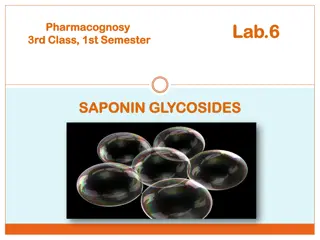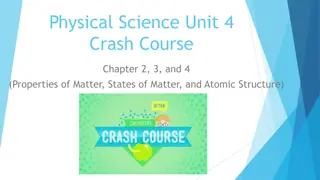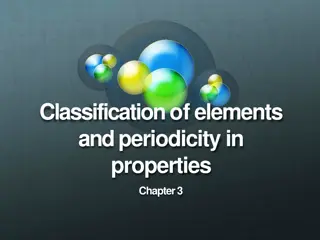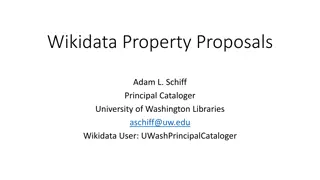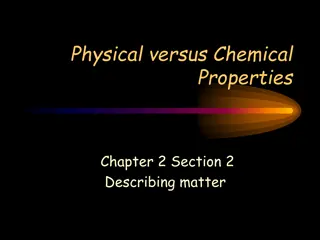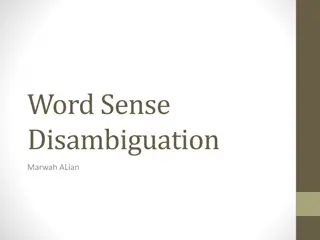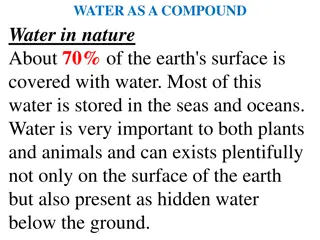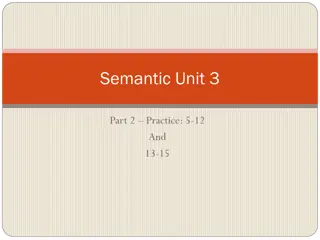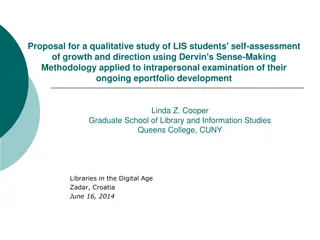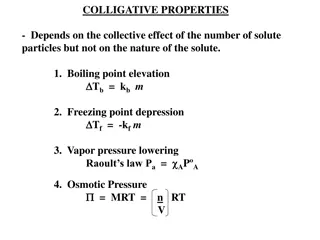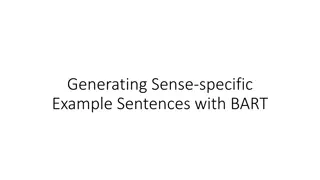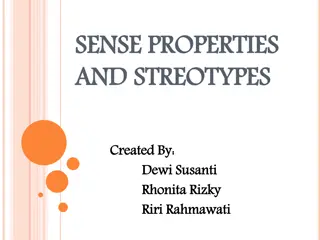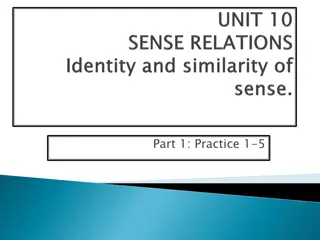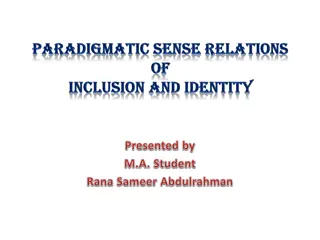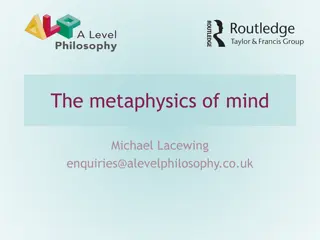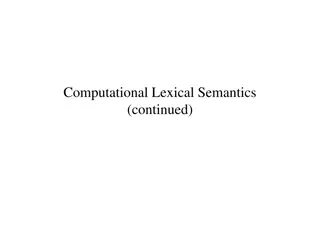Understanding the Rule of Mixtures in Composite Materials
The Rule of Mixtures (ROM) is a weighted method for predicting the properties of composite materials, such as fiber-reinforced polymers (FRP). This method relies on assumptions regarding the homogeneity and properties of fibers and matrices. By combining volume fraction and properties linearly, the
5 views • 23 slides
Understanding Saponin Glycosides in Pharmacognosy: Properties and Applications
Saponin glycosides, found in various plants, are compounds with diverse benefits ranging from cholesterol regulation to potential anticancer properties. They form colloidal solutions in water and are used in soap manufacturing due to their unique properties. Additionally, saponins have bitter taste,
7 views • 18 slides
Understanding Properties and States of Matter in Physical Science
Matter is made up of elements that cannot be broken down further. Different mixtures have distinct properties, such as solutions, colloids, and suspensions. Physical properties like viscosity and density can be observed without changing the material's composition. Chemical properties, like flammabil
2 views • 15 slides
Jane Austen Sense and Sensibility
Sense and Sensibility by Jane Austen explores the societal norms and limitations imposed on women in 19th century England through the contrasting characters of Elinor and Marianne Dashwood. The novel satirizes the excessive sensibility and lack of practical sense in women of that era, shedding light
1 views • 11 slides
Unlock the power of real-time oil condition analysis with SENSE
\n\nUnlock the power of real-time oil condition analysis with SENSE-2! Easily install this monitoring kit on any equipment and start enjoying the benefits: \u2714\ufe0f Reduced oil use \u2714\ufe0f Lower maintenance costs \u2714\ufe0f Early fault detection. Say goodbye to guesswork and hello to effi
0 views • 2 slides
South East Asia Collagen
Collagen, with its unique properties, has been extensively used in food processing industries. These properties are usually categorized into two groups. First, the properties associated with its gelling behavior, such as texturizing, thickening, gel formation, and water binding capacity, and second,
0 views • 2 slides
Guidelines for Handling Case Properties and Seized Assets in Legal Proceedings
This informative content discusses the handling of case properties involved in offenses, including seizure, custody, disposal, and coordination among government departments. It covers various aspects such as the types of case properties, custody procedures, provisions under Section 516-A Cr.PC, and
0 views • 8 slides
Evolution of Translation Theory: From Literal to Sense-for-Sense
Western translation theory up to the 20th century revolved around the debate of literal, free, and faithful translation. This discussion traces back to Cicero and St. Jerome and has influenced translation practices for centuries. While some advocated for word-for-word translations, others, like St.
1 views • 13 slides
Understanding Furan and Thiophene: Structures, Properties, and Uses
Furan and Thiophene are important heterocyclic organic compounds with distinct structures and properties. Furan, a five-membered aromatic ring, is used in specialty chemical production and has unique physical properties. Thiophene, a sulfur-containing compound, finds applications in agrochemicals an
2 views • 8 slides
Sociology and Common Sense: Exploring the Boundaries
Sociology and common sense intersect in intriguing ways, with common sense offering raw material for sociological theories yet lacking the validity and reliability that sociology strives for. While common sense is rooted in tradition and often status quoist, sociology challenges the taken-for-grante
2 views • 11 slides
Classification of Elements and Periodicity in Properties: Overview and Evolution
The journey of understanding the classification of elements and periodicity in properties begins with early laws like the Law of Triads and Newland's Law of Octaves. Mendeleev's Periodic Law revolutionized the organization of elements, leading to the modern periodic table. Discoveries of eka-alumini
3 views • 32 slides
Understanding Physicochemical Properties of Drugs
The physicochemical properties of drugs play a crucial role in their pharmacological effects. These properties include physical and chemical characteristics that influence interactions with biomolecules. Solubility, partition coefficient, and dissociation constant are key factors affecting drug beha
1 views • 46 slides
Algebra Rules and Properties
Explore the fundamental rules and properties of algebra and indices, including commutative, associative, and distributive properties. Learn about negation, zero properties, and the zero factor property, illustrated with examples and common errors. Engage in activities to apply and test your understa
1 views • 21 slides
Understanding Wikidata Properties and Data Types
Learn about Wikidata properties and data types, their importance in structuring data, and how they are used to create statements and qualifiers in Wikidata. Explore the purpose of properties, their labels, descriptions, aliases, and data types such as items, strings, monolingual text, external ident
0 views • 26 slides
Understanding Number Sense in Children: Development and Teaching Methods
Explore the concept of number sense, its development in children, effective teaching methods, and the impact of research findings on classroom practice. Learn about numerical fluency, components of number sense, and the role of place value, quantity, relationships, and symbols. Discover how to enhan
0 views • 28 slides
Understanding Physical and Chemical Properties of Matter
Explore the distinction between physical and chemical properties of matter in Chapter 2, Section 2. Physical properties can be observed without changing the substance's identity, such as color and density, while chemical properties require altering the substance to observe characteristics like react
5 views • 20 slides
Understanding Nonelectrolytes in Solutions
Physical properties of substances are classified into colligative, additive, and constitutive properties. Colligative properties depend on the number of particles in a solution and are similar for different nonelectrolytes. Additive properties are based on the total contribution of atoms, while cons
1 views • 14 slides
Understanding Word Sense Disambiguation: Challenges and Approaches
Word Sense Disambiguation (WSD) is a complex task in artificial intelligence that aims to determine the correct sense of a word in context. It involves classifying a word into predefined classes based on its meaning in a specific context. WSD requires not only linguistic knowledge but also knowledge
2 views • 12 slides
Water as a Compound: Essential Properties and Properties
Water, a vital element covering 70% of the Earth, is composed of hydrogen and oxygen. It has various physical and chemical properties, acts as a universal solvent, and plays crucial roles in nature. From boiling and freezing points to chemical reactions, water's significance is undeniable. Its sourc
0 views • 63 slides
D-Block Elements: Properties and Classification in Chemistry
Welcome to the Department of Chemistry at Kisan Veer Mahavidyalaya, Wai. Explore the Chemistry of Elements of the 3d series, focusing on d-Block Elements and Transition Elements. Learn about their electronic structure, colored ions, magnetic properties, oxidation states, and complex formation. Under
0 views • 34 slides
2020 Company Confidential - Add-Ons and Variable Properties Guidelines
This document provides guidelines for add-ons and variable properties within the context of the 2020 Company Confidential data. It covers various aspects such as variable validations, logic return types, export/import considerations, and the handling of accessory items. The content emphasizes the pr
0 views • 39 slides
Understanding Semantic Sense in Language Expressions
Explore the concept of semantic sense in language expressions, including the relationship between sense and reference, multiple senses of words, and examples of phrases with different meanings. Discover how sense plays a crucial role in understanding language and communication.
1 views • 15 slides
Self-Assessment of LIS Students' Eportfolio Development Using Sense-Making Methodology
Explore how LIS students assess their personal growth and direction through Dervin's Sense-Making Methodology applied to intrapersonal examination of their eportfolio development. The study aims to enhance students' sense of purpose, inform curriculum improvements, and promote reflective learning th
0 views • 24 slides
Understanding Colligative Properties in Solutions
Colligative properties in solutions depend on the total concentration of solute particles present, impacting properties such as boiling point elevation, freezing point depression, vapor pressure lowering, and osmotic pressure. Boiling point elevation is directly proportional to the number of solute
1 views • 19 slides
Generating Sense-specific Example Sentences with BART Approach
This work focuses on generating sense-specific example sentences using BART (Bidirectional and AutoRegressive Transformers) by conditioning on the target word and its contextual representation from another sentence with the desired sense. The approach involves two components: a contextual word encod
0 views • 19 slides
Promoting Civic Sense: Building a Better Community Together
Civic sense involves responsible behavior towards one's community and surroundings, enhancing the quality of life, building a sense of community, reducing pollution and littering, creating safer communities, ensuring enhanced safety, and improving infrastructure. It fosters unity, cleanliness, safet
1 views • 10 slides
Exploring Campus Climate, Sense of Belonging, and Student Engagement at a Women's College
This presentation delves into the experiences of students at a small, liberal arts women's college regarding campus climate, sense of belonging, and student engagement. Research questions focus on student perceptions, engagement levels, and their impact on educational outcomes. The study investigate
2 views • 23 slides
Factors Affecting Undergraduate Students' Sense of Belonging in STEM Disciplines
Student attrition in STEM fields remains a critical issue, with women and underrepresented minority students facing higher dropout rates. Sense of belonging is identified as a key factor influencing retention, particularly for female and URM students. This study explores various aspects, including r
0 views • 22 slides
Insights into Jane Austen's Sense and Sensibility
Jane Austen, an English novelist, delves into the themes of marriage, social standing, and economic security in her works, notably in "Sense and Sensibility". The novel follows the lives of the Dashwood sisters, Elinor and Marianne, exploring the contrast between sense and sensibility. With her biti
2 views • 12 slides
Understanding Physical and Chemical Properties of Matter
Explore the distinction between physical and chemical properties of matter in Chapter 15, Section 2. Learn to classify properties such as color, flammability, odor, shape, taste, density, and more. Understand how physical properties can be observed without altering the substance's identity, while ch
0 views • 17 slides
Understanding Sense Properties and Stereotypes in Language
Effective communication hinges on shared meanings of words. Disagreements over word meanings can hinder understanding. Analyzing examples like distinguishing between "killed" and "dead" showcases how language's sense properties shape communication. Exploring analytic, synthetic, and contradictory se
0 views • 14 slides
Exploring the Sense of Touch: A Journey Through Our Senses
Our sense of touch plays a crucial role in how we perceive the world around us. Through our skin, we feel sensations like pressure, texture, and temperature, allowing us to interact with our environment. This interactive journey delves into the concept of touch as one of our five senses, exploring i
0 views • 7 slides
Understanding Sense and Reference in Everyday Language
Explore the use of words like "mean," "meaning," and "meant" in everyday language, delving into whether they indicate sense or reference in different contexts. Dive into examples and concepts like synonymy, sense, and interdependence, enhancing your understanding of language nuances.
0 views • 10 slides
Understanding Sense Relations in Linguistics
Sense relations play a crucial role in linguistics, influencing the significance and connection between words. Various aspects such as recurrence, discrimination, lexicalizability, abstract vs. concrete relations, multiple simultaneous relations, and the entities involved characterize sense relation
0 views • 17 slides
Sense-making from Learning Analytics: Exploring Challenges and Opportunities
This collection of images delves into the realm of learning analytics, emphasizing the complexities of sense-making and the challenges faced. It discusses the interpretation of granular behavioral measures, the role of proxies in understanding behavior, and the importance of selecting well-supported
0 views • 10 slides
Understanding Transitivity of Properties in Typed Systems
Exploring the concept of transitivity in properties within a typed system, this content delves into explicit and possibly transitive properties, showcasing how properties relate to each other and how they can be implicitly or explicitly defined. Through examples and explanations, the content provide
0 views • 18 slides
Comprehensive Course on Material Properties and Science
Delve into the world of material properties and science with a course led by Professor Shyan-Lung Chung from the Department of Chemical Engineering at National Cheng Kung University. Explore topics ranging from atomic scale structures to mechanical properties and their applications, supported by opt
0 views • 10 slides
Exploring the Metaphysics of Mind: Substance, Properties, and Views
Delve into the realm of metaphysics as it pertains to the nature of reality, with a focus on substance and properties. Explore the concepts of substance dualism, monisms like idealism and materialism, and the debate around mental properties and their relation to physical properties. Consider various
0 views • 8 slides
Understanding Word Sense Disambiguation in Computational Lexical Semantics
Word Sense Disambiguation (WSD) is a crucial task in Computational Lexical Semantics, aiming to determine the correct sense of a word in context from a fixed inventory of potential word senses. This process involves various techniques such as supervised machine learning, unsupervised methods, thesau
0 views • 67 slides
Entity-specific Rankings of Knowledge Base Properties
Towards entity-specific rankings of knowledge base properties, this research explores the problem of property ranking for entities based on their attributes and properties. Various applications in knowledge base curation and natural language generation are discussed, along with related work in entit
0 views • 26 slides

